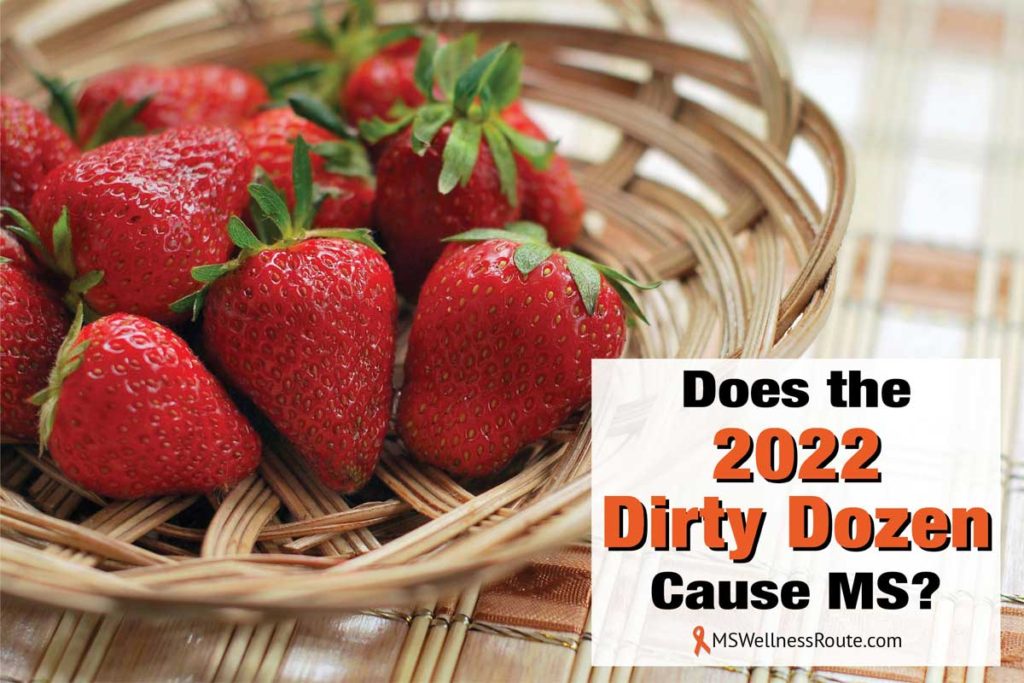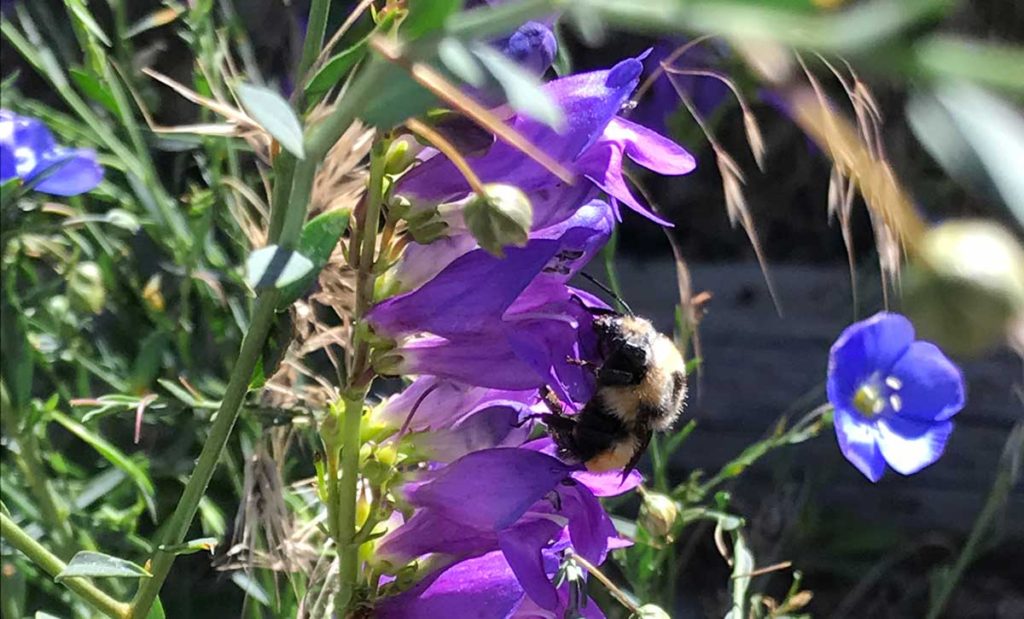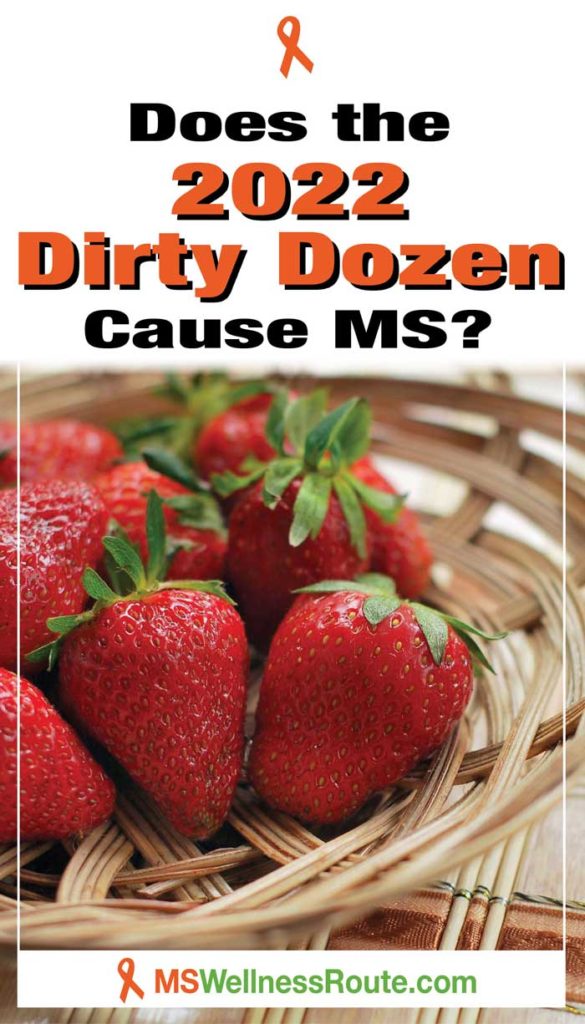Last Updated on November 17, 2023 by Cathy

On average the typical American only eats one or two servings of vegetables and fruit a day. But, if you want to stop the progression of multiple sclerosis (MS). You need to eat at least 9 cups every day. Ten or more cups each day is even better. Nine or ten cups may sound like a lot but it really isn’t.
Two cloves of garlic equal one cup, one small apple equal one cup, and about 10 spears of asparagus also equal one cup. That’s not a lot of food but those three items equal three cups. – See how easy that was.
Pesticides are important to deter or kill pests from destroying crops. However, the use of pesticides has greatly increased over the past couple of decades. Pesticides may protect crops but what are they doing to humans and wildlife?
Pesticides and Wildlife

I live in a rural area that used to have an abundance of wildlife. But because of pesticides, the wildlife I used to see on a daily basis has disappeared. My flower garden attracted many bees, bumblebees, butterflies, and dragonflies. Thanks to pesticides, I rarely see them today and bumblebees are nearly extinct in my state.
We used to have literally hundreds of birds of prey flying overhead and nesting in nearby trees. Including falcons, hawks, owls, and occasionally eagles. One year Argentina was overrun with grasshoppers. To protect their crops they increased their pesticide use to kill the grasshoppers.

The photo above is one of many Swainson’s Hawks that lived around my home. Each winter they migrate to South America. One of their food sources is grasshoppers. Yes, the same grasshoppers that were eating the pesticides in Argentina. That following summer the hawks were gone which made us wonder why. Then we discovered thousands of Swainson’s Hawks died due to the pesticides in Argentina, it was a devastating loss.
Pesticides and Humans
There are many different kinds of pesticides depending on what it’s used for. Such as controlling bugs, fungus, rodents, and weeds.
Types of pesticides:
- Insecticides
- Fungicides
- Herbicides
- Rodenticides
Pesticides not only pose a risk to wildlife, but they also pose a risk to people. According to the Environmental Protection Agency (EPA), “high-level pesticides don’t pose a risk.”
That is for the average American who only eats one or two servings of vegetables and fruit a day. What about people who eat 9-10 cups each day? That small amount of “high-level pesticides” is now a larger risk. Pesticides are chemicals meant to kill.
Granted eating produce with pesticides won’t kill you. But what about your cells? Switching to an organic diet dramatically lowers the glyphosate, found in Roundup. It is the most widely used weedkiller and is also found in the human body.
One study found people in areas with high pesticide use had an increased risk for neurological diseases. Another study found that farm workers who work around pesticides had a higher risk of MS.
Pesticides increase the risk of:
- Alzheimer’s disease
- Certain cancers
- Multiple Sclerosis
- Parkinson’s disease
“Exposure to pesticides may affect the human health by increasing the incidence of certain neurological disorders.” – PubMed
The EWG is Looking Out for You
EWG stands for Environmental Working Group. It is a nonprofit organization that specializes in research to protect the consumer. They cover agricultural subsidies, corporate accountability, drinking water, and toxic chemicals.
Every year the EWG releases its report on produce with the most and least amounts of pesticides. Research finds more people today are more concerned about their food than in the past. And for good reason.
MS is a chronic inflammatory disease of the central nervous system. The CNS consists of the brain, optic nerve, spinal cord, and a vast network of nerves and neurons. When MS attacks it damages the CNS causing neurological damage and permanent disabilities. Studies linked pesticides with neurological diseases such as MS.
“Several epidemiological studies have identified pesticide exposure as a significant risk factor for neurological disorders, including Parkinson’s disease, Alzheimer’s disease and multiple sclerosis.” – PubMed
Dr. Terry Wahls, the author of The Wahls Protocol, grew up on a farm that used pesticides. She believes this is the root cause of her MS. She was able to reverse her MS by eating a healthy diet of 9 cups of vegetables each day.
Eat 3 cups of fruits and vegetables from each group:
- Leafy greens, tightly packed raw or cooked
- Deeply colored vegetables and fruit
- Sulfur vegetables such as asparagus and cabbage
The “Dirty Dozen” list includes vegetables and fruit with the most pesticides. Critics claim EWG used a “shaky methodology used to obtain that data.” But, studies show pesticides harm human health, wildlife, and the environment.
Remember, pesticides increase a person’s risk for MS. Plus, you will be eating more produce than the average person. It only makes sense to reduce your exposure whenever possible.
2022 Dirty Dozen and Clean Fifteen
EWG released its new Shopper’s Guide to Pesticides in Produce. Which includes the “Dirty Dozen” and “Clean Fifteen” lists.
More than 70 percent of non-organic fresh produce sold in the U.S. contains residues of pesticides. Over 50 percent of potatoes, spinach, lettuce, and eggplant had bee-killing insecticides. The European Union banned its use but it is still allowed in U.S. produce.
The 2022 Dirty Dozen list is similar to last year with strawberries and spinach at the top of the top. And Avocados are at the top of the list for the Clean Fifteen. Here is a full list from EWG’s website:
Dirty Dozen:
- Strawberries
- Spinach
- Kale, collard & mustard greens
- Nectarines
- Apples
- Grapes
- Bell & hot peppers*
- Cherries
- Peaches
- Pears
- Celery
- Tomatoes
*Several pepper samples contain levels of pesticides that can harm the nervous system.
EWG based the rankings not only on the percentage but also on the number of pesticides. Number 3 on the list had the most pesticides detected, 103 and 101 pesticides in total. A single sample of kale, collard, and mustard greens had up to 21 different pesticides.
Clean Fifteen:
- Avocados
- Sweet corn**
- Pineapple
- Onions
- Papaya**
- Sweet peas (frozen)
- Asparagus
- Honeydew melon
- Kiwi
- Cabbage
- Mushrooms
- Cantaloupe
- Mangoes
- Watermelon
- Sweet potatoes
**You should avoid corn because it’s a grain. A small amount of corn sold in the U.S. is from genetically modified organisms (GMO) seeds. Papaya and summer squash may also be from genetically modified seeds. Buy organic varieties of these crops if you want to avoid GMOs.
Almost 70 percent of Clean Fifteen produce samples had no detectable pesticide residues. If you can’t find or afford organic buy organic only if it shows up on the Dirty Dozen list.
Quick Links To Information In This Post:
How To Save On Organic Groceries
What Is The Wahls Protocol?
Epstein-Barr Virus Is The Leading Cause Of MS
Does the 2022 Dirty Dozen cause MS?
The vegetables and fruit on the Dirty Dozen list don’t necessarily cause MS. But, high pesticide exposure leads to neurological diseases. The herbicide linuron, which is used to kill weeds, is a known risk factor for the onset of neurological diseases such as MS.
Researchers recently announced the Epstein-Barr virus is the main cause of MS. However, they believe MS is triggered by a combination of factors including pesticides.
When it comes to food, make wise choices about what you eat. Food can either feed disease or fight it. However, don’t let the Dirty Dozen list stop you from eating vegetables and fruit. It is better to eat non-organic produce than to avoid eating any produce at all.

Free Wellness Library!
Subscribe for free and I’ll send you the password to my secret library filled with many printables for your wellness journey.
Want to remember this health tip? Pin it to your Pinterest board!

Resources:
https://www.ncbi.nlm.nih.gov/pmc/articles/PMC7557078/
https://www.health.harvard.edu/nutrition/how-many-fruits-and-vegetables-do-we-really-need
https://www.ncbi.nlm.nih.gov/pmc/articles/PMC5464684/
https://pubmed.ncbi.nlm.nih.gov/35096268/
https://www.ncbi.nlm.nih.gov/pmc/articles/PMC3595011/
https://www.ehn.org/glyphosate-organic-food-2646939278/particle-4
Does the 2022 Dirty Dozen cause MS?





